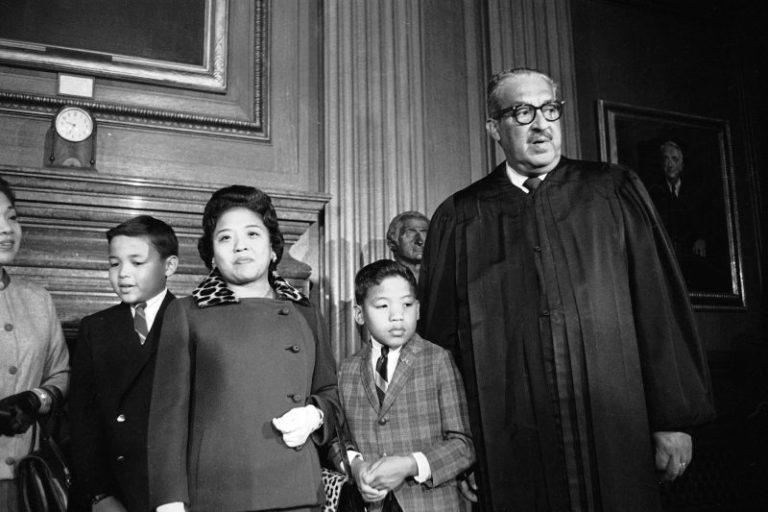Cecilia “Cissy” Marshall, a former NAACP legal secretary who safeguarded the reputation and legacy of her late husband, Thurgood Marshall, a towering civil rights lawyer who became the first Black justice on the U.S. Supreme Court, died Nov. 22 in Falls Church, Va. She was 94.
The Supreme Court announced her death in a statement but did not cite a cause.
The daughter of Philippine immigrants, Mrs. Marshall — then known as Cissy Suyat — grew up in Hawaii and arrived after World War II in New York, where she took night classes to become a court stenographer. A clerk at an employment office “saw my dark skin, and she sent me to the national office of the NAACP,” she told The Washington Post years later.
Her starting pay, in 1948, was $35 a week, but she rapidly advanced in salary and responsibilities. She worked on school desegregation cases for the NAACP Legal Defense and Educational Fund, typing briefs and taking notes as lawyers rehearsed oral arguments.
Her duties also included accompanying Defense Fund officers on trips to the Deep South, where they faced down sometimes-menacing local opposition. Once, she recalled in a government oral history, she was riding in a car when one passenger asked another to open the glove compartment.
Inside was a Bible and a pistol. If threatened, she recalled the man saying, “We use the Bible first.”
In May 1954, Thurgood Marshall triumphed at the Supreme Court as the NAACP’s lead lawyer in Brown v. Board of Education of Topeka, the landmark ruling that outlawed racial segregation in U.S. public schools. In the ensuing months, he became distraught as his first wife, Vivian “Buster” Burey, succumbed to lung cancer. She died in February 1955.
Soon thereafter, Marshall “began assiduously courting” Suyat, journalist Wil Haygood wrote in his 2015 biography “Showdown: Thurgood Marshall and the Supreme Court Nomination That Changed America.” They often left the office together and were seen dining in each other’s company at Harlem restaurants. Among NAACP staffers, it did not go unnoticed that, at 26, she was 20 years Marshall’s junior.
He proposed marriage, but she rebuffed him for reasons other than age, she told The Post. “No way,” she recalled telling him. “People will think you are marrying a foreigner.”
Interracial marriage was an especially sensitive issue then at the NAACP. In the late 1940s, after Executive Director Walter White divorced his wife and married a White woman, he faced a backlash from White and Black people. “His two sisters … excoriated him, telling him he had let the Negro race down,” Haygood wrote of Walter White.
But Marshall would not be deterred.
“I don’t care what people think. I’m marrying you,” she remembered him saying. He persisted, and she finally accepted. They were married Dec. 17, 1955, at an Episcopal church in Harlem, where Roy Wilkins, then executive secretary of the NAACP, gave her away. The Rev. Martin Luther King Jr. and Rosa Parks were among the visitors to pay their respects at the couple’s apartment.
NAACP leaders had received advance notice of the nuptials. Only after the ceremony was the media informed. There was little if any public outcry.
In 1961, President John F. Kennedy appointed Marshall to the U.S. Court of Appeals for the 2nd Circuit in New York. The couple settled in the Washington area in 1965, when President Lyndon B. Johnson tapped him as U.S. solicitor general. Marshall was named to the Supreme Court in 1967.
The Marshalls also started a family. Cissy Marshall took the lead in the guidance and care of their two sons and the management of their home in Falls Church while her husband was often absent, either traveling or working long hours.
“Who’s that man?” her son Thurgood Jr. once said upon seeing a picture of his father, according to Haygood’s book. Mrs. Marshall tried to explain to her children the importance of his work and the sacrifices it entailed for their family. He retired from the court in 1991 and died in 1993.
Survivors include their sons, Thurgood Marshall Jr. of Arlington, Va., and John Marshall of Falls Church; four grandchildren; and three great-grandchildren.
In a 1998 biography, “Thurgood Marshall: American Revolutionary,” journalist Juan Williams wrote that, especially in Justice Marshall’s later years, he became known for a gruff and distant manner even with staff members and friends — the result of what Williams characterized as a gnawing “frustration with the conservative court and what remained of the civil rights movement.”
Cissy Marshall said she tried to encourage her husband to express himself, while also working diligently to shield him from embarrassing social encounters.
“Once in a while he’ll explode,” she told Williams. “I wish he would explode more and get it out of his system. But he keeps a lot in.”
Cecilia Suyat was born in Pu’unene, Maui, on July 20, 1928. She was young when her mother died. Her father, who owned a printing business, sent her to New York to live with relatives, in part to keep her away from a boyfriend of whom he disapproved because he spoke a different Filipino dialect.
“For my father, that was a no-no,” she told The Post. “Imagine that? Another dialect, instead of another race? So he said, ‘You go to New York with your aunt and uncle and take some business courses. And if you still love him in a year, come back and marry him.’ ”
She instead married Marshall. She told The Post they had a playfully combative relationship based partly on the fact that he was a strapping 6-foot-2, and she was 4-foot-11.
“How’s the weather down there, gal?” he sometimes teased her.
“Same as up there, man,” she would answer. “I’d keep telling him: ‘I don’t care how tall you are. I could still beat you up. I’ll get on a chair.’ ”

